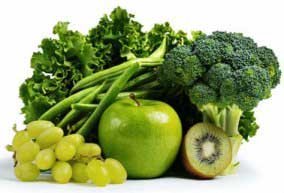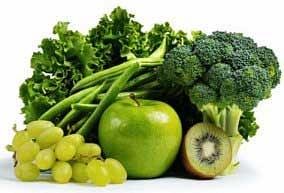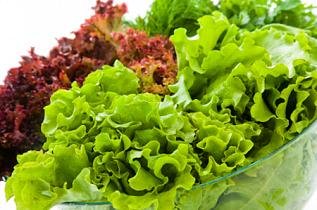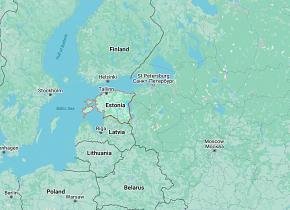Vitamin K prevents and fights cancer
Dr. Mercola documents that Vitamin K is an extremely important but often overlooked as a supplement in relation to preventing and fighting
Vitamin K also has anticancer effects and is useful in the treatment of many different types of cancer, including liver, colon, lung, stomach, nasopharynx, breast, oral and leukemia.
Most of the research has focused on synthetic vitamin K3 taken at high doses, and it is commonly being used with chemotherapy agents for enhanced effectiveness. However, I do not advise using the synthetic vitamin K3, but rather the plant-based vitamin K1 (phylloquinone) and bacterially produced vitamin K2 (menaquinone).
Studies have shown that vitamins K1 and K2 are also effective against cancer. For instance, one study, published in the September 2003 International Journal of Oncology, found that treating lung cancer patients with vitamin K2 slowed the growth of cancer cells, and previous studies have shown benefit in treating leukemia.
Chris Woollams documents: “It was given the name ´K´ as it was originally identified by German scientists as a vitamin responsible for ´koagulation´.â€
Mr. Woollams elaborates:
“Worldwide, only a handful of researchers study vitamin K, although it has been long known for its role in blood clotting. Apart from this you will find mentions of its involvement with bone health but little else. Most web sites report that the vitamin is in abundant supply, and this may be why it gets so little press. Well, it´s time to think again.â€
Watch the video below for supplementary insights in Vitamin k.
Food high in Vitamin K:
#1: Herbs (Dried and Fresh) Long used for medicinal purposes, herbs are packed with nutrients and vitamin K is no exception. Dried Basil, Dried Sage, and Dried Thyme all contain the most with 1715μg (2143% RDA) per 100g serving, or up to 51μg (64% RDA) per tablespoon. They are followed by Fresh Parsley (82% RDA per Tblsp), Dried Coriander, Dried Marjoram, Dried Oregano, and finally fresh basil with 10μg (13% RDA) per tablespoon.
Long used for medicinal purposes, herbs are packed with nutrients and vitamin K is no exception. Dried Basil, Dried Sage, and Dried Thyme all contain the most with 1715μg (2143% RDA) per 100g serving, or up to 51μg (64% RDA) per tablespoon. They are followed by Fresh Parsley (82% RDA per Tblsp), Dried Coriander, Dried Marjoram, Dried Oregano, and finally fresh basil with 10μg (13% RDA) per tablespoon.
Click to see complete nutrition facts
#2: Dark Leafy Greens 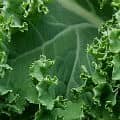
Click to see complete nutrition facts
#3: Spring Onions (Scallions) 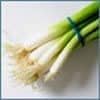 Great as a topping on soup or stew, as well as a good ingredient in salads and salad wraps, 100 grams of spring onions (or 1 cup chopped) will provide 207μg (259% RDA) of vitamin K.
Great as a topping on soup or stew, as well as a good ingredient in salads and salad wraps, 100 grams of spring onions (or 1 cup chopped) will provide 207μg (259% RDA) of vitamin K.
Click to see complete nutrition facts
#4: Brussels Sprouts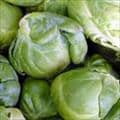 A delicious side or snack, and reputed for being able to prevent a hang over, brussel sprouts are packed with Vitamin K. 100 grams will provide 194μg (242% RDA) of vitamin K, that is 156μg (195% RDA) per cup, and 33.6μg (42% RDA) of vitamin K in a single brussel sprout.
A delicious side or snack, and reputed for being able to prevent a hang over, brussel sprouts are packed with Vitamin K. 100 grams will provide 194μg (242% RDA) of vitamin K, that is 156μg (195% RDA) per cup, and 33.6μg (42% RDA) of vitamin K in a single brussel sprout.
Click to see complete nutrition facts
#5: Broccoli Vitamin K is just another reason to eat everyone's favorite vegetable. Broccoli contains 141μg (176% RDA) of vitamin K per 100g serving, that is 220μg (276% RDA) per cup, and 52μg (65% RDA) in an average spear, or piece, of brocolli.
Vitamin K is just another reason to eat everyone's favorite vegetable. Broccoli contains 141μg (176% RDA) of vitamin K per 100g serving, that is 220μg (276% RDA) per cup, and 52μg (65% RDA) in an average spear, or piece, of brocolli.
Click to see complete nutrition facts
#6: Chili Powder, Curry, Paprika, and Cayenne  Also high in vitamins E and C, chili powder is a great addition to spice up a stew, calzone, or just about anything. 100 grams will provide 106μg (132% RDA) of vitamin K per 100g serving, or 8.5μg (11% RDA) per tablespoon. Curry powder will provide 7% RDA per tablespoon, Paprika (7% RDA), and Cayenne (5% RDA).
Also high in vitamins E and C, chili powder is a great addition to spice up a stew, calzone, or just about anything. 100 grams will provide 106μg (132% RDA) of vitamin K per 100g serving, or 8.5μg (11% RDA) per tablespoon. Curry powder will provide 7% RDA per tablespoon, Paprika (7% RDA), and Cayenne (5% RDA).
Click to see complete nutrition facts
#7: Asparagus  Asparagus is best eaten steamed. 100 grams will provide 80μg (100% RDA) of vitamin K, that is 144μg (180% RDA) per cup, and 48μg (60% RDA) in 4 spears.
Asparagus is best eaten steamed. 100 grams will provide 80μg (100% RDA) of vitamin K, that is 144μg (180% RDA) per cup, and 48μg (60% RDA) in 4 spears.
Click to see complete nutrition facts.
#8: Cabbage 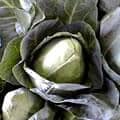
Click to see complete nutrition facts.
#9: Pickled Cucumber  If you like pickles then now you have good reason to eat more of them. 100 grams will provide 77μg (96% RDA) of vitamin K, or 130μg (163% RDA) per cup sliced, and 27μg (34% RDA) in a medium pickle. For best health (and the most vitamin K) eat the low sodium variety.
If you like pickles then now you have good reason to eat more of them. 100 grams will provide 77μg (96% RDA) of vitamin K, or 130μg (163% RDA) per cup sliced, and 27μg (34% RDA) in a medium pickle. For best health (and the most vitamin K) eat the low sodium variety.
Click to see complete nutrition facts.
#10: Prunes 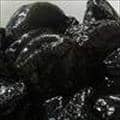
Click to see complete nutrition facts
Internet site references:
http://www.canceractive.com/cancer-active-page-link.aspx?n=507 http://www.mercola.com
Comments
There are 0 comments on this post


